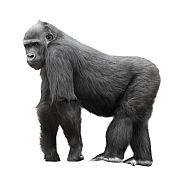- Could Your Grocery Store Meat Be Causing Recurring UTIs?
- Are You Making This Expensive Thermostat Error This Winter?
- Recognizing the Signs of Hypothyroidism
- 10 Strategies to Overcome Insomnia
- Could Artificial Sweeteners Be Aging the Brain Faster?
- Techniques for Soothing Your Nervous System
- Does the Water in Your House Smell Funny? Here’s Why
- Can a Daily Dose of Apple Cider Vinegar Actually Aid Weight Loss?
- 6 Health Beverages That Can Actually Spike Your Blood Sugar
- Treatment Options for Social Anxiety Disorder
Scientists Map DNA of Endangered Mountain Gorillas


The first mapping of the DNA of mountain gorillas offers some positive news about the endangered animals, researchers report.
The number of mountain gorillas in Africa’s Virunga mountain range fell to about 253 in 1981 due to hunting and habitat destruction, but has since grown to almost 500 as a result of conservation measures, the new report reveals.
“Mountain gorillas are among the most intensively studied primates in the wild, but this is the first in-depth, whole-genome analysis,” study corresponding author Chris Tyler-Smith, of the Wellcome Trust Sanger Institute in England, said in an institute news release.
“Three years on from sequencing the gorilla reference genome, we can now compare the genomes of all gorilla populations, including the critically endangered mountain gorilla, and begin to understand their similarities and differences, and the genetic impact of inbreeding,” Tyler-Smith said.
The researchers were surprised to discover that many harmful genetic variations had been eliminated through inbreeding, and that mountain gorillas are genetically adapting to surviving in small populations.
The study was published April 9 in the journal Science.
“This new understanding of genetic diversity and demographic history among gorilla populations provides us with valuable insight into how apes and humans, their closely related cousins, adapt genetically to living in small populations,” study corresponding author Aylwyn Scally, of the department of genetics at the University of Cambridge in England, said in the news release.
“In these data we can observe the process by which genomes are purged of severely deleterious mutations by a small population size,” Scally explained.
More information
The World Wildlife Fund has more about the mountain gorilla.
Source: HealthDay
Copyright © 2026 HealthDay. All rights reserved.










